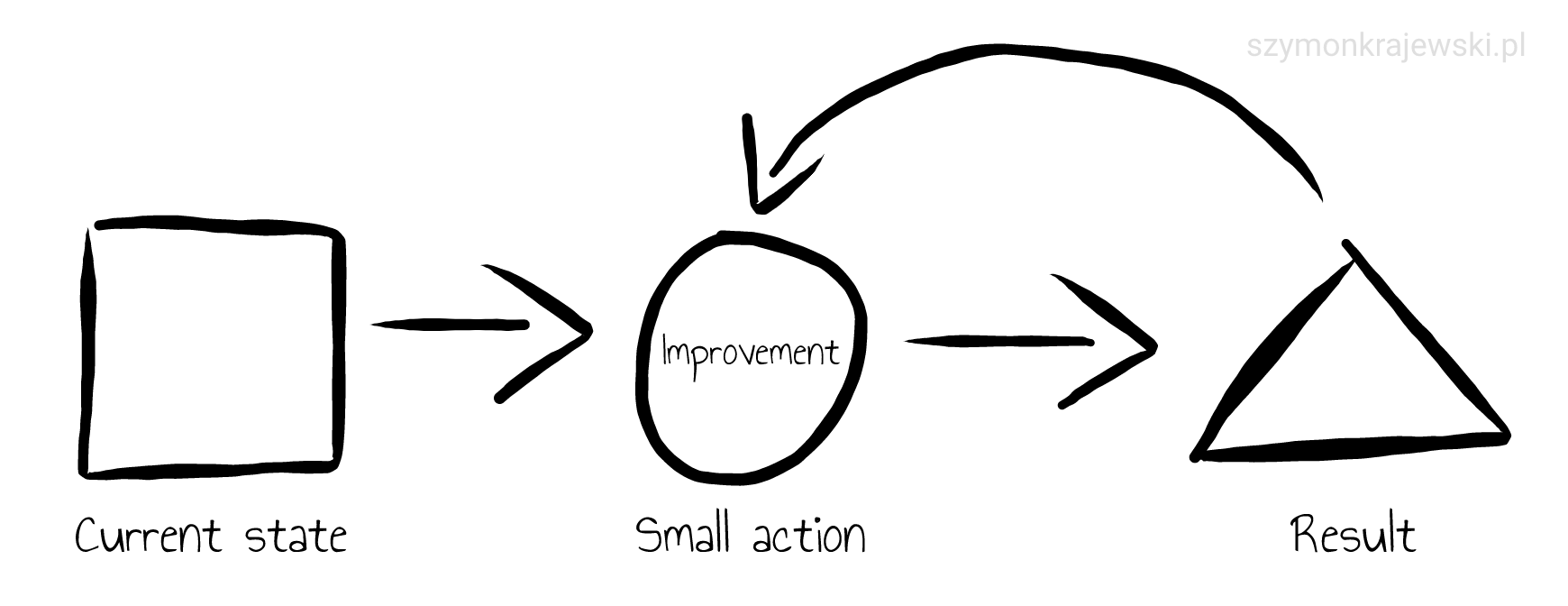Think big, start small

When I think about a new idea or my next goal in life, I usually think big. The goal has to be ambitious and attractive to me, otherwise, it’s not worth putting effort into it. However, big goals also overwhelm me, because I don’t know where I should start. So I prepare. And I think. And I prepare. And I think. And this loop goes on.
It changed. The endless loop of thinking about the best approach to achieve the goal or to do whatever you want means that you probably try to start with something big. To break it, just do the opposite – think big, but start small.
The big problem
The biggest problem with every idea is that we inaccurately think of the final effect as the result of a single action. We’re in the current position, so we need to do something and in the result, we achieve our desired goal.

The goal is usually big, so we change plans and refine things, looking for perfection when we don’t even know what it means and how it looks. Doing something sounds like a feasible activity, but it’s a delusion. In effect, instead of doing even small steps, we do nothing at all. We just think and prepare.
Starting big leads to procrastination
Thinking and preparing also refer to procrastination. Sometimes we excuse ourselves saying that we need to have a plan or schedule – to be on track. Or that we need to revalidate the idea a third time because something should look different. Or because it’s not a good time. Or because of reason. It’s all about avoiding failure.
Planning as an excuse
By having a good plan, you can mitigate the risk of failure. By improving your plan, you can reduce the risk even more. By constantly working on your plan, you can eliminate the risk of failure – If you do nothing, you don’t fail.
A good plan today is better than a perfect plan tomorrow. Don’t wait for an inspired ending to come to mind. Work your way to the ending and see what comes up.
Andy Weir
I don’t mean you shouldn’t make plans. Having a plan it’s OK as long as it helps you move forward. But it doesn’t perform the move – it’s your responsibility.
Start with something small
Being a famous blogger or Instagram influencer, building profitable project, developing recognizable open-source library, or collecting 10000 dollars for local charity – there are examples of thinking big. However, you can’t achieve any of these goals at night. Things last. What you should do is to start with a small action, then observe the results and ultimately improve it in time – continuously.

The idea should be ambitous and developmental, however, our steps towards the goal should be small enough to fullfill all of our needs at this moment and give us more opportunites for further development. If something went wrong, consequences will be smaller, so we can go back and revalidate our actions or update our plans according to results. Evolution, instead of revolution.
Consequences of starting small
Sooner or later: you’ll get your job done.
Things are not perfect and almost everywhere we can see the field for potential improvement. However, by starting small we create something that is usable. We can test the idea. We can create a habit. We can discard the idea if it’s no longer relevant for us. We can get feedback. We can change decision. Ultimately, by starting small you can reach your goal without even noticing that.
Maybe it’s more appropriate to say that you should act small?
Start small is not about laziness
Think big means that our idea should be big. This is the goal – something we would like to achieve in the future. Start small means that we shouldn’t do everything we think we would need at this moment. Just the small action that brings us closer to the goal. Because we don’t know what we should do next.
The space between current state and the goal is unknown. Do first step and look if it’s in a right direction. Then do next one. And another one. This is actually a journey and, who knows, maybe you’ll discover something even more important?
Thanks to Krzysztof Szulka and Dawid Kuśmierek for reading draft of this article.
Featured photo by Jukan Tateisi on Unsplash.